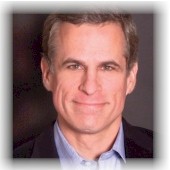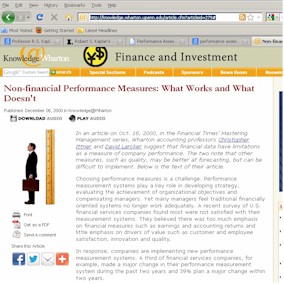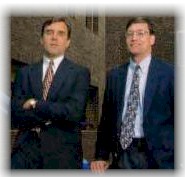- non-financial indicators

| Performance
Assessment
- non-financial indicators |
 |
This page last updated 2012 Nov 30
Non-Financial Performance Indicators
Limiting evaluation,
by only allowing judgement of an enterprise based on financial indicators,
is detrimental,
since in Y2K+ companies
with global brands are judged on categories much broader than financial
ratios.
WTGR
 |
Professor
R.S. Kaplan of Harvard Business School in The Evolution of Management
Accounting states : "..... if senior managers place too much emphasis
on managing by the financial numbers, the organisation's long term viability
becomes threatened."
Before teaching at Harvard Business School, Kaplan served as Vice Chairman of The Goldman Sachs Group, supervising with the Investment Banking and Investment Management Divisions |
| Non-Financial
Performance Indicators
explained by students |
In a "in-class exercise" Nov 2nd in CCT224 at University of Toronto, Mississauga Campus, the students were divided into groups and discussed "non-financial indicators" using sources and resources they are familiar with. |
 |
After
a generous amount of discussion, we filmed a member of each student group
who presented, casually, what the group had concluded.
Then two students (Hana Elali and Arun Babber)(raynmagic.com) took these video segments and using an editor, compiled the segments into one long video which we subsequently uploaded to YouTube Nov 28th 2012. The purpose of the video is to explain Non-Financial Performance Indicators, in simple language, and using examples and situations students are familiar with. basically "things that indicate
a company is doing well, or poorly, other than money focused items"
|
| Non-Financial
Performance Indicators
explained by students |
Some
of the points mentioned by some of the groups in the video include
|
| Non-Financial
Performance Indicators
branding |
Most
of the groups in the video discussed things in terms of how you "work your
brand" and mentioned things companies can do to cause their brand to be
popularized, which in turn effects sales growth and is an indicator of
the company's performance.
|
 |
Professor
Christopher Ittner and Professor David Larcker at Wharton wrote an article
in 2000 in the Financial Times "Mastering Management" series. The article
was widely quoted and one version of it online is at
http://knowledge.wharton.upenn.edu/article.cfm?articleid=279# "many managers feel traditional financially oriented systems no longer work adequately" Ittner and Larcker write
"Inadequacies in financial performance measures have led to innovations
ranging from non-financial indicators of "intangible assets" and "intellectual
capital" to "balanced scorecards" of integrated financial and non-financial
measures."
|
 |
Professor
Christopher Ittner and Professor David Larcker at Wharton
Ittner and Larcker explain that "Non-financial measures offer four clear advantages over measurement systems based on financial data." 1. "Financial evaluation systems generally focus on annual or short-term performance against accounting yardsticks. They do not deal with progress relative to customer requirements or competitors, nor other non-financial objectives that may be important in achieving profitability, competitive strength and longer-term strategic goals." 2. "drivers of success in many industries are "intangible assets" such as intellectual capital and customer loyalty, rather than the "hard assets" allowed on to balance sheets. " 3. "non-financial measures can be better indicators of future financial performance. Even when the ultimate goal is maximizing financial performance, current financial measures may not capture long-term benefits from decisions made now. Consider, for example, investments in research and development or customer satisfaction programs." 4. "the choice of measures should be based on providing information about managerial actions and the level of "noise" in the measures. Noise refers to changes in the performance measure that are beyond the control of the manager or organization, ranging from changes in the economy to luck (good or bad). Managers must be aware of how much success is due to their actions or they will not have the signals they need to maximize their effect on performance." |
|
|
CONTACT I MAIN PAGE I NEWS GALLERY I E-BIZ SHORTCUTS I INT'L BIZ SHORTCUTS I MKTG?BUSINESS SHORTCUTS I TEACHING SCHEDULE |
| . | |
|
MISTAKES
ITEXTS
USED I
IMAGES
I
RANK
IDISCLAIMERI
STUDENT
CONTRIBUTORS I FORMER
STUDENTS I PUBLICATIONS
I |
|
| . |